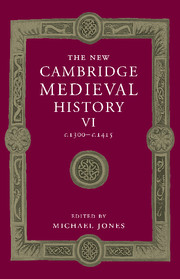Book contents
- Frontmatter
- Part I General Themes
- Part II The States of the West
- 13 The British Isles
- 14 France
- 15 Italy in the age of Dante and Petrarch
- (a) The Italian North
- (b) Florence and the Republican Tradition
- (c) The Italian South
- 16 The empire
- 17 The Low Countries, 1290–1415
- 18 The Iberian Peninsula
- Part III The Church and Politics
- Part IV Northern and Eastern Europe
- Appendix Genealogical Tables
- Primary Sources and Secondary Works Arranged by Chapter
- Index
- Frontispiece
- Plate section
- Map 4 Europe's trade, c. 1300
- Map 5 Europe's trade, c. 1400
- Map 7 The Hundred Years War to 1360
- Map 15 Russia, c. 1396
- Map 17 The Byzantine empire in the 1340s
- References
(b) - Florence and the Republican Tradition
from 15 - Italy in the age of Dante and Petrarch
Published online by Cambridge University Press: 28 March 2008
- Frontmatter
- Part I General Themes
- Part II The States of the West
- 13 The British Isles
- 14 France
- 15 Italy in the age of Dante and Petrarch
- (a) The Italian North
- (b) Florence and the Republican Tradition
- (c) The Italian South
- 16 The empire
- 17 The Low Countries, 1290–1415
- 18 The Iberian Peninsula
- Part III The Church and Politics
- Part IV Northern and Eastern Europe
- Appendix Genealogical Tables
- Primary Sources and Secondary Works Arranged by Chapter
- Index
- Frontispiece
- Plate section
- Map 4 Europe's trade, c. 1300
- Map 5 Europe's trade, c. 1400
- Map 7 The Hundred Years War to 1360
- Map 15 Russia, c. 1396
- Map 17 The Byzantine empire in the 1340s
- References
Summary
by the first decade of the fourteenth century, Florence had become a great trading city, had evolved a political system which allowed its leading merchant families to enjoy power without provoking the destructive feuds that had marred its earlier history and was on the threshold of an outburst of creative vitality in literature and art that produced the great works of Dante, Giotto and their contemporaries. A hundred years later, it stood on the verge of the most brilliant age of its culture, that of the Renaissance. In between, it passed through a crisis that led to ideological and intellectual readjustments, enabling some of the inheritance of the past to be preserved in a modified form and some to be transformed to suit new circumstances. Between about 1301 and 1342, the city drew on the capital of its previous achievements, enjoying a period of commercial expansion, of comparative internal stability and of successful, if ultimately wasteful, military conflicts with its neighbours. Then, between 1342 and 1382, came a time of economic and demographic contraction and crisis, and of tension between elements in the Florentine community which had previously either been reconciled to each other or held in check by dominant political forces. This was a stage in the city’s history when there was a break with the lines of development of the past without a clear sense of new directions emerging to replace them. Finally, between 1382 and about 1402, the authority of its political elite came to be reasserted and the foundations laid for a new culture.
- Type
- Chapter
- Information
- The New Cambridge Medieval History , pp. 469 - 487Publisher: Cambridge University PressPrint publication year: 2000

